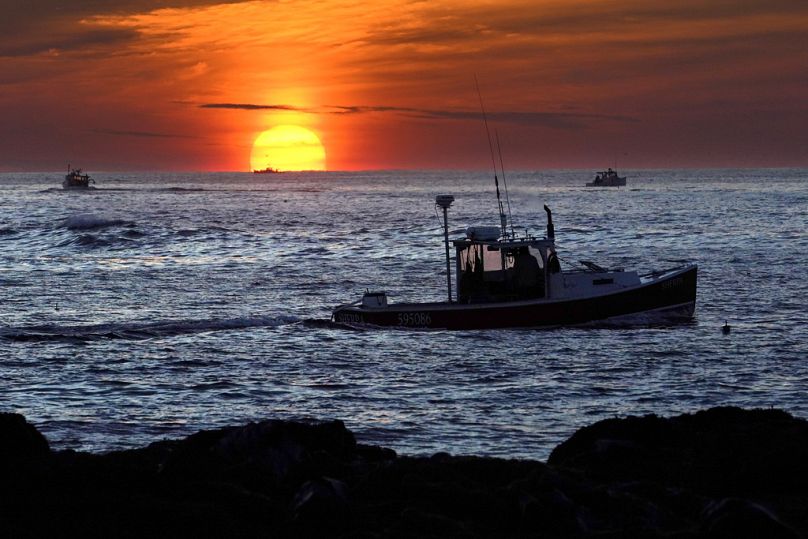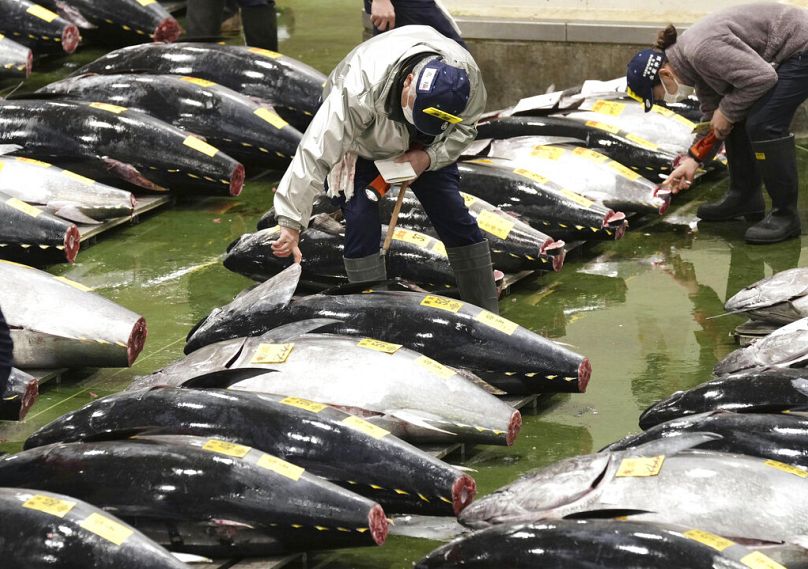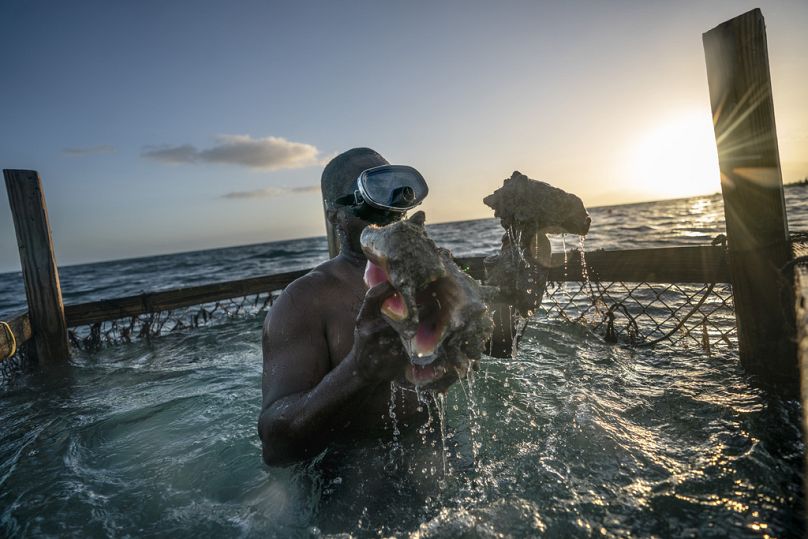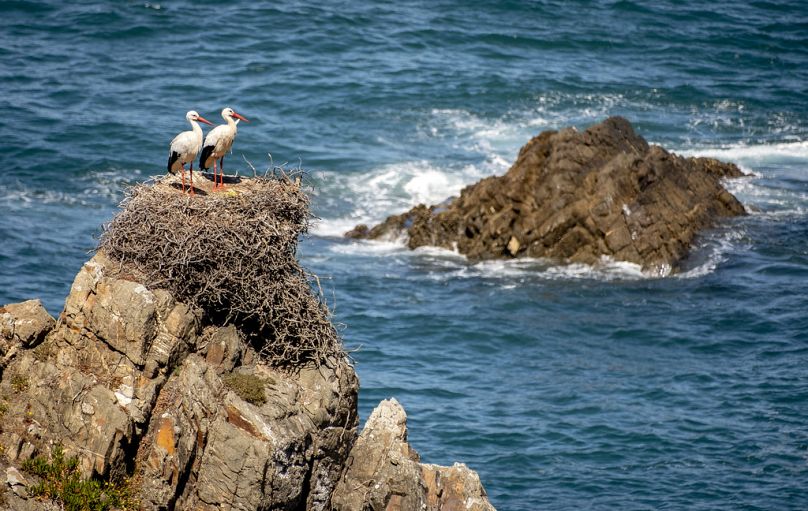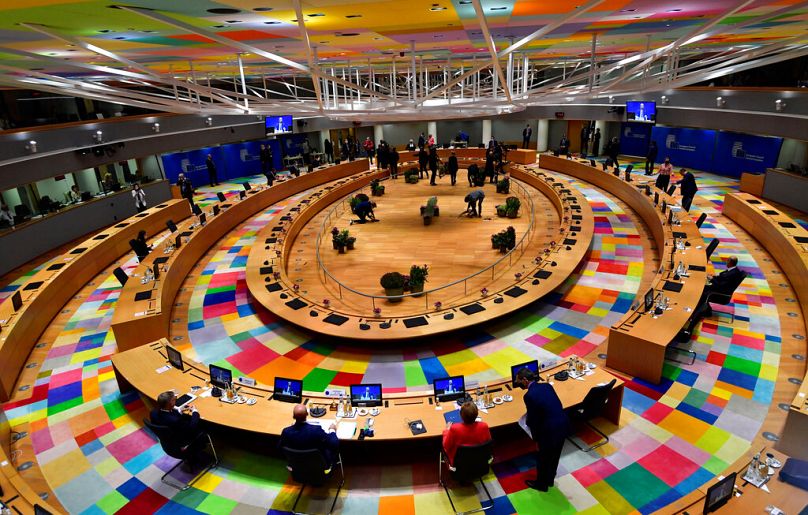To mark World Oceans Day and EU Green Week, Euronews View spoke to Marine Stewardship Council's Dr Rohan Currey about how overfishing affects our lives and what could and should be done to make fisheries across the globe more sustainable
When it comes to the food we get from our oceans, the stark reality is that more than one-third of the world’s fish stocks are currently being depleted beyond their sustainable limits.
We have long treated the ocean as a pit of limitless resources, but overfishing has become one of the main drivers of the decline of ocean wildlife, which represents 80% of the planet’s biodiversity, according to the United Nations Food and Agriculture Organisation (UN FAO).
At the same time, humans worldwide now consume around 144 million tonnes of fish per year — more than double the amount we ate five centuries ago — and demand is only expected to increase as the world’s population grows.
To mark World Oceans Day and the EU Green Week, Euronews View spoke to Dr Rohan Currey, Chief Science and Standards Officer at the Marine Stewardship Council (MSC) and a member of its Global Executive Committee, about the causes of overfishing, its consequences, and what can be done to better utilise the world's oceans as a source of food for us and the generations to come.
Euronews View: This Thursday, which also marks World Oceans Day, your organisation released new figures in a comprehensive report, calling on global governments to address the overfishing crisis. Why do you believe this is the key moment to decide on how to manage fishing in a more sustainable way?
Dr Rohan Currey: The global crisis of overfishing in the oceans is driven by a number of factors, but one of the factors that we're particularly concerned about is overfishing and the associated effect of overfishing on marine biodiversity.
This is something that's been well documented. The UN FAO conducts a report. They write what's called the SOFIA (The State of World Fisheries and Aquaculture) report, which has described that a third of global fish stocks are still overfished and that train is going in the wrong direction, still.
And this is despite the fact that for 25 years now, ever since the UN FAO produced a code of conduct for responsible fisheries, we've had a very good idea of what good fishing practices look like.
And indeed, in many parts of the world, we're able to see that applied, and many of those fisheries have been certified by the MSC because of those practices being successful in delivering good outcomes for the oceans.
So the reason why we're focused for our campaign on what's going on with overfishing and how that relates to the oceans is, one underappreciated fact that would be very beneficial to come from managing oceans better is that we would gain a significantly increased amount of seafood from the oceans if we managed them better and that could be of immense benefit to humanity.
Euronews View: When you say managing things better, what does that mean in practice? Could you describe what's the difference between the practice now versus the practices that you are proposing?
Dr Rohan Currey: So a well-managed fishery has a number of features, and those features are that they harvest in a way that maintains a stock that is healthy and continues to produce a large volume of fish into the future, so the fisheries can operate in perpetuity.
They minimise their impact on the environment, and they have systems in place to ensure that that's not a one-off event that this continues.
Our fisheries standard has codified this in a very detailed way, and it's now applied very broadly in fisheries around the world to describe precisely what "good" looks like. We see fisheries that have made journeys to improve to become sustainable.
And also, fisheries that were already sustainable, when they become certified, they get that recognition, and that can lead to a benefit for them in the marketplace because consumers can then be confident that the fisheries they're buying from are actually managed sustainably.
The reason why this is so critical is that when you manage that way, not only do you have a benefit for our oceans, which of course, on World Oceans Day, we should be celebrating.
But in addition to that, there is a significant benefit for the community from the fact that you actually get a "sustainability dividend", a bonus that comes from managing well.
And in this case, managing well might mean setting a catch limit. It might mean using a different gear type. It might mean operating in different areas of the ocean.
But if you use a science-based approach to manage the way that you fish, this sustainability dividend could be considerable, and our estimate for that is that could be as high as 16 million tonnes of seafood.
So that 16 million tonnes is being foregone at present and if it was available, it could be of immense benefit to humanity.
Euronews View: How did this issue of overfishing come to be? How long is this been going on? What was the root issue caused it?
Dr Rohan Currey: It's a very good question. The cause of overfishing is the fact that for a long time, people really didn't understand that the ocean had limits. They perceived the ocean as so vast.
And when humanity's technology was only sort of relatively at an early stage of development, that was in some respects the case because we're limited by our own capacity to go out and fish.
So in the early days, it was thought to be boundless and limitless. What we've now come to realise with advancing technology with a better understanding of the oceans is that actually, humanity is capable of having a significant impact on this, and it's exacerbated by the fact that the oceans themselves, in many places, they're global commons.
And that means there is an active incentive for individuals to go out there and to fish, and it may have a detrimental impact on others but the benefit accrues to them and to the detriment of someone else.
So the global commons phenomenon is particularly important when it comes to exacerbating this problem, but we've seen specific examples play out. Industrial whaling was one of the first great fishery collapses where people didn't have a good handle on how many whales they could take and take sustainably.
And as a result, we saw whale populations plummet in some cases to below 1% of what was originally there.
Then we saw the collapse of the cod stocks of New England. And in fact, that was one of the reasons why the MSC as an organisation was established because civil society and the markets became incredibly concerned about the impact of overfishing, where you could drive a stock to collapse.
And so we wanted to find a way to recognize people doing the right thing to complement what governments are doing in regulating it.
So that was the genesis of this. It's a long-standing problem. It's a problem that's become more difficult over time, and I would say it's a problem that's only going to get worse with climate change as fish stocks shift and they move into different areas, and the productivity of the ocean changes as well.
So it's critically important that we manage and address the overfishing crisis. Otherwise, we won't be able to continue to eat seafood into the future, and our oceans will be poorer for it as well.
Euronews View: How do the market demand, trends, or a particular type of fish growing in popularity when it comes to human consumption affect the current situation in the oceans?
Dr Rohan Currey: I would say that different market drivers operate in different parts of the world, and what you often see is that people have an affinity for particular fish species or fish stocks that they've often grown up with, and they're very familiar with and as a result of that the market tends to be concentrated on certain kinds of species.
What then happens is the market will look to source that fish, and in some cases, if stocks have become depleted, they may not source it from the adjacent fisheries, which might have been historically how it came to have that cultural connection.
They'll look to other markets to find that, and to some degree, that substitution is part of why I think the global fish trade is such a complex thing.
Fish is one of the most widely traded commodities on the planet with some of the most complex supply chains, and a lot of that's got to do with where fish are processed.
But it's also got to do with the fact that, as there have been places where it hasn't been particularly well-managed, people have had to source from elsewhere to get the fish that they've originally become used to having.
And again, this is one of the drivers for thinking about sustainable management long term. These fish stocks, they're not just important in terms of the nutrient benefits, which is obviously something critical.
But I would also say there is a cultural component to this where people are associated with particular kinds of seafood, and people being able to continue to source from that and to eat that seafood into the future is incredibly important.
Euronews View: How does this affect people living in landlocked countries of Europe and other continents, or those who don't necessarily have direct access to the sea, or those not used to a seafood-based diet?
Dr Rohan Currey: Well, our oceans are incredibly important for us in many different ways. Obviously, they are a source of food, and whether we live by the coast or not, people will still rely on seafood as one of their sources of protein and nutrients in different parts of the world.
But in addition to that, about half of the oxygen that we breathe comes from the oceans and so managing the oceans well is so important for us.
They provide a sort of lifeblood for us, they maintain the functioning of our climate, and that critical role is directly related to how healthy they are, and that includes the life within them.
So maintaining oceans in a healthy state is something that we all should care about and that we all benefit from, and ultimately that's why it's so important to make the most of things like World Oceans Day to raise awareness of what's necessary for our oceans to continue to thrive into the future.
**Euronews View: And lastly, what could and should be done? What would be your call to action?
**
Dr Rohan Currey: I would ask that the policymakers recognise the benefits of sustainable fisheries and put in place measures to support that.
What we're finding at the moment around the world is that the enabling environment for sustainable fisheries management is not necessarily going in the right direction.
This is partly a function of the polarisation we see in the world around us and the geopolitical tensions that seem to be ramping up.
But for those who are making decisions about fisheries, it's critically important to recognise the responsibility that comes with that to look after our oceans and the benefits that come to humanity from doing it.
I'd also highlight that we've seen some pretty amazing actions taken by governments in recent times where there have been remarkable success stories.
For example, the world's largest tuna fisheries operate in the Western and Central Pacific Ocean, and recently just in December last year, they agreed to a landmark harvest strategy, which is going to regulate the way that they conduct the fishery for skipjack tuna.
That multi-million-tonne fishery which is the world's largest for tuna, is now regulated in part to address this pressing need to make sure that the oceans remain sustainably managed in perpetuity.
And given that things like climate change will affect fish stock distribution, that was very much at the forefront of people's minds.
So if possible, my call to action would be for people to recognise this as important and to take action and to know that it's possible because some people are already doing it.












